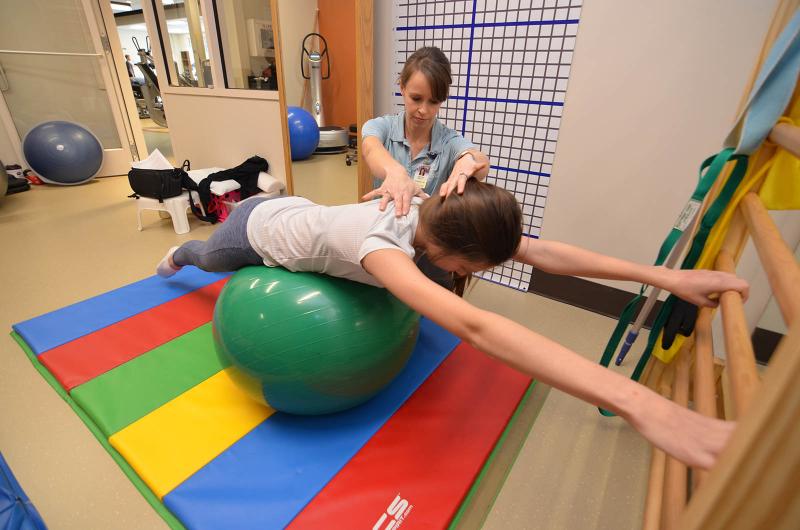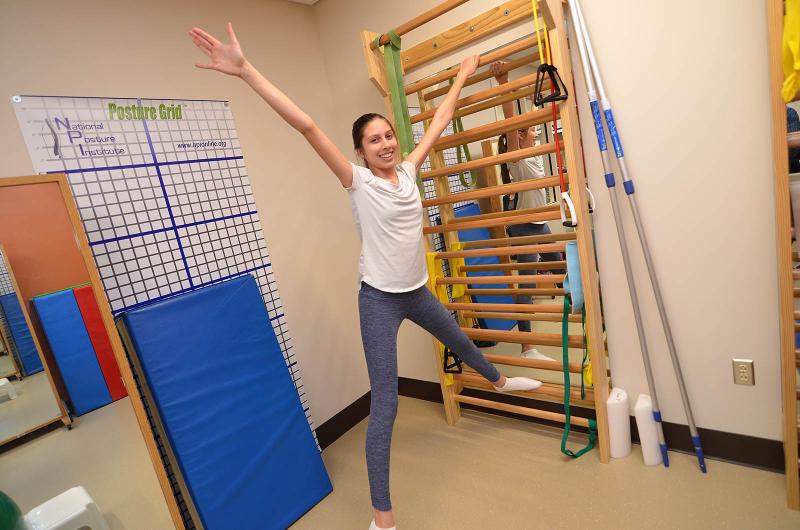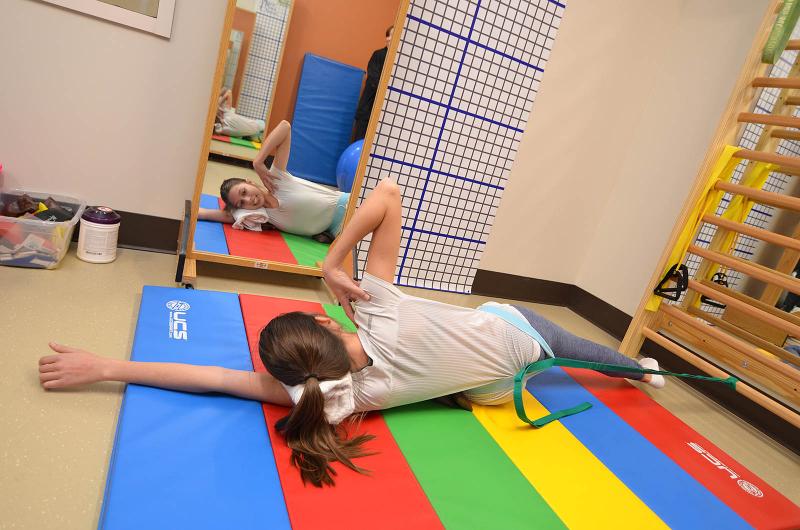When her 14-year-old daughter Deanna was diagnosed with scoliosis, Victoria Wilbourn became a mom on a mission.
Researching online for the best possible treatment, she came across overwhelmingly positive feedback on Schroth Therapy. The nonsurgical, physical therapy-based treatment originated in Germany and is becoming more sought-after in the U.S.
“I was sure that this treatment is exactly what my daughter needed,” Wilbourn said.
Willing to spare no expense, she first took Deanna to a Boston area clinic to be fitted for a custom made orthotic back brace, and for an intensive week of the therapy. But after further research, the Madison mom was surprised to find that there were therapists highly skilled in the innovative therapy right in her own backyard.
“I tried googling Schroth Therapy in Mississippi,” Wilbourn said. “And I came upon an article about Methodist Rehabilitation Center offering the therapy. Then I came to find out that they were the only place in the entire state.”
Today, MRC employs the only three physical therapists certified to administer Schroth Therapy in Mississippi. Elizabeth Rich, who also serves as therapy manager for the Methodist Outpatient Therapy clinic in Ridgeland, was the first to complete the training and is certified as C2, the highest level of certification. She is joined by physical therapist Rachel Cooley, who is also C2 certified. At Methodist Outpatient Therapy clinic in Flowood, physical therapist Amy Macon has completed the C1 level of training.
At the time, Deanna was under the care of Dr. Catherine Zimmerman, a pediatrician specializing in non-operative pediatric orthopedic care at the University of Mississippi Medical Center in Jackson.
“Victoria is a very proactive parent,” Zimmerman said. “She has a background in science, and she could filter through the information that’s out there on the internet very well. So she could figure out what was hocus-pocus and what really had some legitimacy.”
Zimmerman says she had become familiar with Schroth Therapy during her fellowship in non-operative pediatric care in Madison, Wisc.
“I myself was also really surprised when I learned Elizabeth had completed the training,” Zimmerman said. “It’s not just unique for Mississippi. Nashville doesn’t have it—Memphis doesn’t have it. So we are very fortunate that we have these physical therapists that are very dedicated and have a passion for it.”
Zimmerman says that when Wilbourn asked about Schroth Therapy she was happy to give her a referral to MRC. She knew it would complement her care well.
“I think it is very beneficial as an adjunct treatment for scoliosis, particularly for the symptoms and pain that can be associated with the condition,” Zimmerman said. “While I don’t replace my traditional recommendation to use orthotic bracing with this therapy, it is very complementary to it.”
Deanna started a regimen of Schroth Therapy with Rich in January of 2017. Her overall course of care has not only slowed the progression of her curve, it has reversed it by a significant margin.
“Our main goal with adolescent patients is always to delay the progression, or better yet, stop the progression, or, ideally, even reverse the curvature,” Rich said.
“Elizabeth has been just excellent. I’m absolutely sure that surgery isn’t even a question anymore,” Wilbourn said. “The doctor told me that if you are able at all to stop scoliosis from getting worse, then that’s a victory. So this really is a huge victory.”
Rich says that Schroth has the potential to prevent or delay the need for invasive surgery, which has been a traditional treatment for many adolescent scoliosis sufferers.
“Schroth Therapy is one of the only conservative treatment approaches to scoliosis,” she said. “It treats the condition from a three-dimensional approach, looking at it from three different planes of movement. Not just the lateral curvature, but also the rotation and any front-to-back disturbances in the spine as well. It focuses—especially during peak growth periods in adolescents—on obtaining a corrective posture and strengthening the patient in that posture.”
Even if surgery is necessary, Schroth Therapy can benefit patients post-op.
“Sometimes surgery is indicated, but we’re able to help patients post-surgery get their maximum movement and work on correcting their posture,” Rich said.
The therapy is even beneficial for adults who have already undergone surgery and may be experiencing back pain later in life.
“We can work with them to get them in a better posture to alleviate their pain,” Rich said.
Rich says that a typical course of Schroth Therapy consists of 10 to 15 initial sessions.
“When I feel like the patient is independent with their home exercise program, we then move to less frequent appointments to check back in periodically, to add some new exercises so they don’t get bored with the program, and just to make sure that everything has been progressing correctly,” Rich said.
Educating the patient so that they can continue independently is a major component of the therapy, but that also means that it requires discipline.
“Deanna has done really well,” Rich said. “She’s been a model patient. She wears her brace consistently and performs her exercises regularly.”
“I think the exercises are fun, I like doing them,” Deanna said. “And I like that I got to come here and meet other people who have the same trouble that I do with my back. And Elizabeth is so nice. Plus, it gives me a good workout.”
A student at Christ Covenant School in Ridgeland, Deanna has continued to lead an active lifestyle, playing her favorite sport, tennis.
“I’ve noticed a big improvement in her shoulders, they are now absolutely level,” Wilbourn said. “And there’s been massive improvement in her posture. When we went to the beach and she was in her swimsuit, I thought if you didn’t know her you would never think that this child had scoliosis.”
Wilbourn says she hopes telling Deanna’s story will encourage other moms—and dads, too—to seek out the therapy if their child is diagnosed with scoliosis.
“It’s been a year now,” Wilbourn said, “It’s been a long journey, and it’s been a lot of work for Deanna. But it’s so incredibly encouraging when you can see the results.”
To learn more about Schroth Therapy offered by MRC, call 601-984-8700 or visit methodistonline.org/schroth.



